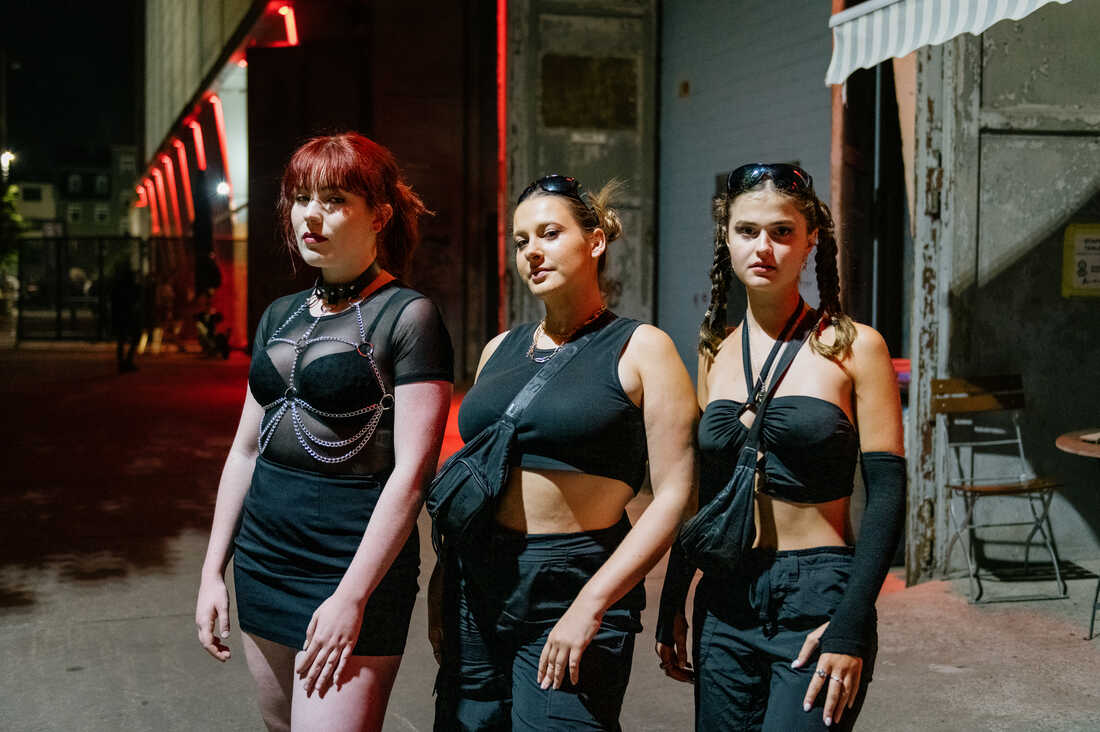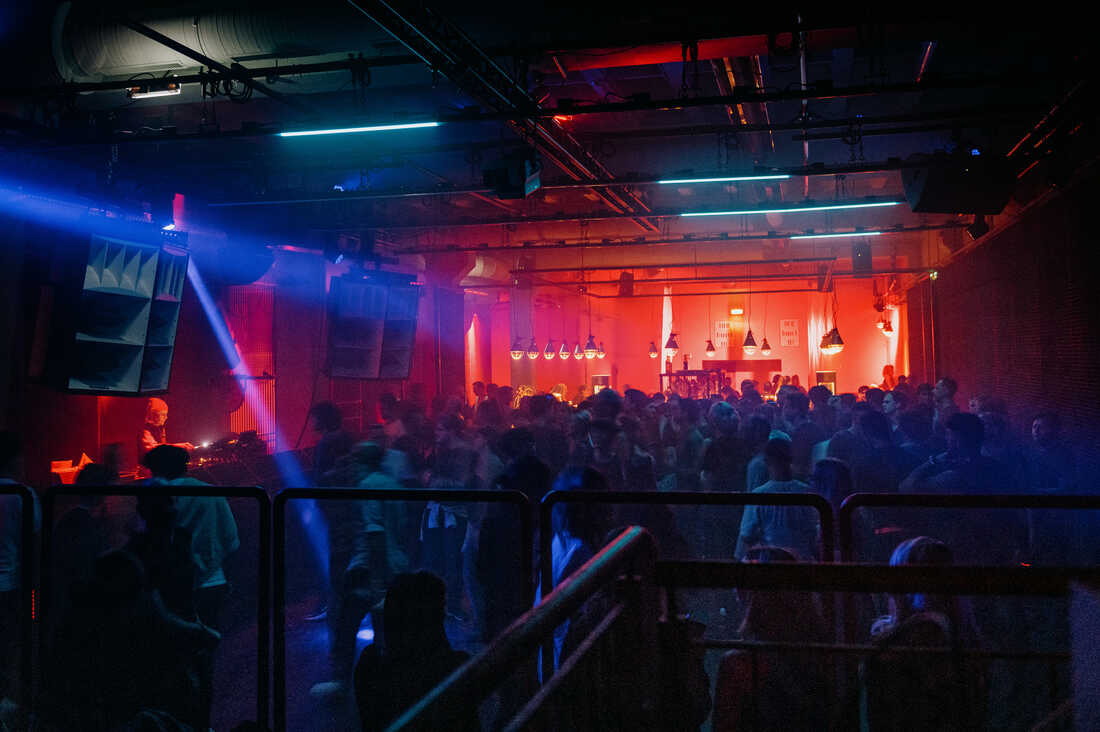How A Whiskeyfueled Meeting In 1949 Led To Berlin's Famed Techno Scene

Left to right: Philippa, 23, from Sydney, Australia; Laura, 23, from Melbourne; and Isabella, 23, from Sydney, stand in the early hours of the 4th Jacobia Dama for NPR .
Berlin, Germany. On Sunday morning, hundreds of people, most dressed in black, gathered outside the Berghain, a Berlin techno club made almost legendary for its selective door entry policy.
Among those waiting to be seen was Chris Kastlin, a photographer from Berlin who visits at least once a month. When Berlin's bars and clubs closed for the first time in 70 years during the pandemic, the fabric of the city was torn, he said.
"For a lot of people, especially in Berlin, clubbing is not like 'Oh, I want to have fun, I want to get drunk,'" he said. "It's more of a lifestyle, more of a hobby to dance and connect with people."

One of the oldest clubs in Berlin, Tresor is housed in a former power plant with three dance floors and a total capacity of 1,500 people. Hide caption Jacobia Dam for NPR
A key factor in the Berlin scene. Clubs should never close their doors. Many stay open all weekend, resulting in some ravers arriving Friday night and leaving Sunday morning.
Berlin's curfew culture has its origins at the start of the Cold War, when whiskey bottle negotiations led to the lifting of the post-war curfew and paved the way for Berlin to become one of the world's most popular tourist destinations. world of techno music.
The whiskey meeting that changed everything
After World War II, divided Berlin enforced a strict nighttime curfew, much to the chagrin of residents, especially those who yearned for freedom.
In 1949, some had had enough.
“After four years, people wanted to hang out, go out again, people wanted to drink,” he said. Dimitri Hegeman, founder and owner of Tresor, one of the oldest clubs in Berlin.

Dmitry Hegeman, 68, founder and owner of Tresor, on August 31 at the power plant, a former power plant that now hosts exhibitions and cultural events in addition to the club. Hide caption Jacobia Dam for NPR
In West Berlin, controlled by the Western Allies, bars closed at 21:00, while in the east, controlled by the Soviet Union, they closed at 22:00.
West Berlin, tired of receiving those last dollars from the East, moved the curfew an hour later. In response, Vostok delayed another hour. An eye for an eye has become a kind of curfew.
The hotel owner, Heinz Zellermeier, is tired. He took a bottle of whiskey and showed Brig his suitcase. General Frank Hawley, commander of the American sector in West Berlin.
“They need the night hours as we need our precious bread,” Zellermeier recalled, according to her sister Ilse Elisa Zellermeier’s family biography.
"Chaos only occurs when the bartender has to say 'closing time,'" the hotel owner said.
Zellermeier said lifting curfews is good for the economy, and the freedom to not have a curfew is an expression of Western values.
Hawley was as convinced as his French counterpart.
However, the release was opposed by the British, who feared that the bar's patrons would become too loud.
No matter. In June 1949, the curfew in West Berlin was finally lifted with a score of 2:1.
Zellermeier quickly shared the news.
“He called all the bars in 10 minutes. And since then, Berlin has been enjoying the young night every day,” Hegemann said. When the Berlin Wall fell, the former East Berlin resigned itself to the absence of a curfew in the West.

Long queues in front of KitKatClub, a popular club in Berlin on September 3. The Kopenickerstraat in Kreuzberg is home to two of the city's most popular clubs, KitKatClub and Tresor, and on most weekends the two streets converge. Hide caption Jacobia Dam for NPR
“How much whiskey was actually drunk is not recorded in history”, but “in the following decades, the myth of Berlin as a city that never sleeps takes shape.” "
Berlin without curfew attracts "techno-tourists" and their money
Zellermeier, who died in 2011, is now a folk hero among Berlin club owners.
The owner of the vault, Hegeman, organized events dedicated to his famous whiskey collection. Some even call Zellermeier the "supermaster" of Berlin's bars and clubs.
But others say Zellermeier doesn't get credit for the 1949 talks.
“What this meant for the city itself and its sights is not entirely clear today,” says Berlin-based filmmaker Knut Hofmeister, who has devoted himself to this chapter of German history.
Hofmeister edited The Global Hangover Guide , a publication focused on alcohol use. In 1999, on the 50th anniversary of the Berlin curfew, he picked up Zellermeier in a limousine. Before entering, Hofmeister handed him a bottle of champagne. He then led Zellermeier to the Brandenburg Gate and posed for a photo with a commemorative sign for half a century without a curfew.

Heinz Zellermeier in front of the Brandenburg Gate in 1999 for the 50th anniversary of a rally to end the curfew in Berlin. Hides the legend of Knut Hofmeister
“He brought people back into the night,” Hofmeister said. "It was an absolutely revolutionary act."
It is also an action that launched a powerful economic engine for the city.
Other cities, of course, have clubs that rage until dawn, or underground scenes where just about anything happens. But Ben Hoek, a professor of cultural studies at the University of Melbourne who studies Berlin's techno scene, says the law that clubs never close has long made Berlin special.

Around 06:15 on September 4, Isabelle and Mauro (left) leave Trezor, while Karam enters Berlin's famous nightclub (right). Hide caption Jacobia Dam for NPR
“I know people have tried it in other cities, but liquor licenses and other regulations like that always kill it,” he said. "So unique in Berlin."
According to the Berlin Club Commission, the so-called techno-tourism attracts more than 3 million people to the city every year. The latest study by the trade association found that clubgoers spend about 1.4 billion euros a year in the city, including accommodation, food and transport, or about 8% of total tourist spending each year.
The city's tourism authorities say the city does not have a curfew to attract visitors.
“Have fun until the sun rises and then sets again. Unlike other cities in Germany, there is no official closing time in Berlin,” the city's VisitBerlin website says.

On September 4, people line up at 1:30 (left) and 6:45 (right) to enter Tresor. Hide caption Jacobia Dam for NPR
Clubs liberate and inspire those who are lucky enough to enter them.
Tresor recently celebrated its 31st anniversary. The club in the former power plant is dark and cavernous. Smoke from cigarettes and smoking cars mingle. Most of the DJs are playing hardcore techno, and the lanterns light up the party and rock to a deafening beat.
At Tresor and other venues like Berghain and KitKatClub, partygoers enjoy music while wearing sunglasses. Sometimes it's the only thing they use.
Before letting people in, the bouncers put stickers on their phones' cameras. Whatever happens in the club, whether it's a dance marathon, sex, or even illegal drug use, it must stay in the club. Privacy is extremely important.
Hegeman, the owner of Tresor, says that clubs are not only about hedonism and escapism, but also about generating ideas.
According to him, when people take a break from dancing and rest in other places of the hall, creative joint projects and business ideas are born. He believes that this is due to the lack of a curfew in the city.
“The best ideas are born after 3:30 in the morning,” he said. “People are gathering, we are gathering, we are saying, hey, we want to join this movement. Let's do something Maybe tomorrow we will open a gallery or a cafe.

The interior of the power plant, the building that houses the Tresor nightclub and exhibition event, August 31. The club is located in the building of a former power plant. Hide caption Jacobia Dam for NPR
“So I think techno changed Berlin, changed Europe, changed the world,” he said.
Back at Berghain, in front of his endless line, photographer Kastlin told the photographer that tourists often read too much on the Internet about what it takes to get into the club, which makes them think about it and dress in all black. Lawsuits that often result in dismissal. .
“It’s not really about the clothes, but people think so,” Kestlin said.
Most Berlin clubs don't let everyone stand in line, but trying to understand the esoteric door politics of Berghain was like trying to navigate a Greek labyrinth. There may be many failed attempts before someone is accepted.
“ Unfortunately not today ,” some jumpers say to naysayers, which means something along the lines of “Today is not your day.”
On weekends, the queue in front of Berghain can stretch for five hours or more. There's even an Instagram page with 48,000 followers dedicated to weekend queue length updates.
Anyone who works at the door outside the entrance will instantly make a decision based on a "subjective" assessment, as a senior bouncer once told GQ .
“You always want to be connected. This is the motto of every good club: diversity, contact,” Sven Marquardt told the magazine in 2015 in a rare interview.
But the city's lack of a curfew allows people to try multiple times on Saturdays and Sundays, Kastlin said.
“You roll the dice every time,” Castlin said. “You have to be yourself and be real. If you look like you're only dressed to get in, they'll smell it. But once you enter, there is no time limit. This is complete freedom. And I love it. " ".

(Top left to right) Katarina, 26, Clara, 23, Christina, 26, and (bottom left) Peter, 30, and Aurelia, 23, queue to enter the Tresor in Berlin September 4. Hide caption Jacobia Dam for NPR


